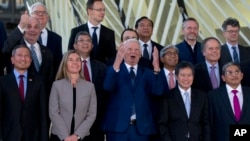EU and Asean ministers wrapped up an annual meeting last week during which members of Cambodia’s former opposition called on EU leaders to continue to apply pressure to the Cambodian government.
Sam Rainsy, the former president of the Cambodia National Rescue Party, which was banned in a Supreme Court decision in November 2017, said EU officials should insist that Cambodia “comply with all provisions of the mutual trade agreements, which provide for functional democracy in Cambodia and respect for human and social rights.”
The 22nd Asean-EU Ministerial Meeting was held in Brussels to consider issues including trade, maritime security, combating terrorism, and migration.
Mu Sochua, the CNRP vice president, said the meeting was needed to raise awareness of Cambodia’s “impediment of the promotion of cooperation and mutual respect.”
The country [Cambodia] cannot get away from the EU or Asean’s pressure,” she added.
The CNRP said human rights violations in Cambodia were continuing, citing the case of the January 16 arrest of an opposition supporter who shared a post about the EU’s imposition of rice tariffs on social media.
Maja Kocijancic, a spokesperson for EU Foreign Affairs and Security Policy, said: “The EU-ASEAN ministerial [meeting] that took place in Brussels on 21 January was a meeting where discussions took place in a multilateral framework and were not focused on a single country.”
Kocijancic said the EU had noted the recent developments in Cambodia, including the release of politicians, activists, civil society and journalists as well as amendments to the law on political parties. The EU considered it "a positive step" and hoped "the government will take further action.”
“If Cambodia were to take credible and satisfactory measures to swiftly remedy the situation that has led us to initiate the withdrawal procedure, the EU would reconsider the situation,” said Kocijancic.
The issue was further reiterated at a bilateral meeting between EU Trade Commissioner Cecilia Malmstrom and Foreign Minister Prak Sokhon.
“We discussed the EBA agreement and the possibility of a withdrawal of the tariff preferences,” said Malmstrom on Twitter. “Reiterated our concerns on democracy, human rights, and rule of law. The EU continues to keep the path of dialogue open.”
Sokhon also confirmed on his Facebook page that he had met with the EU Trade Commissioner, without elaborating on what was discussed.
“This shows that the EU won’t back down, but they keep the channel open for discussion,” said Sochua. “This means that they allow the Hun Sen regime to fulfill its EU obligations if Cambodia wants to use the EU market.”
The EU has launched a withdrawal process of Cambodia’s preferential treatment under the “Everything But Arms” trade scheme due to concerns over human rights violations and political repression of the opposition. The regional bloc has asked their member states to give the green light by Tuesday, according to a Bloomberg report.
Government officials said negotiations between Cambodia and the European Union were underway but claimed that given its alleviated status to a higher income country in the region, it would be unlikely to enjoy continued tariff-free access to EU markets.
“Therefore, we will have to pay some tariffs, but at what level? A preferential one or not for Cambodia,” Phay Siphan, a government spokesman, told VOA Khmer.




